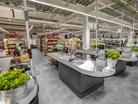Scope 3: UK food retailers unite to tackle GHG emissions

Like every other sector, food and drink retail is committed to tackling its biggest sustainability challenge: Scope 3 greenhouse gas (GHG) emissions.
Scope 3 can account for up to 80% of an organisation's entire carbon emissions. These are indirect emissions occurring in an organisation's value chain, including upstream and downstream activities like employee commuting, business travel, transportation of goods, waste disposal, and the use of sold products and services.
Emissions from the supply chain are far more complex to tackle than Scope 1 (from sources owned or controlled by an organisation, such as onsite fuel consumption) and Scope 2 (indirect emissions from purchased energy used for heating and cooling).
Speaking to sister Magazine, Sustainability, Lucinda Langton, Head of Sustainability at M&S Food, says that Scope three greenhouse gas emissions is “the single biggest challenge we all face in terms of carbon reduction”.
M&S Food is the grocery retail operation of Marks & Spencer, a major British multinational retailer. It runs the company's food halls that sit within M&S department stores, and there are also dedicated M&S Food retail outlets.
M&S Food has a reputation for quality, and an emphasis on provenance, sourcing solely from British suppliers. It plays a crucial role in the company's overall profitability.
The food retail industry is committed to reaching Net Zero by 2040 but Langton says that this is possible “only through meaningful change in Scope 3 emissions”.
Measuring Scope 3 a challenge for food retailers
The typical food retailer deals in thousands of products across multiple brands, which are delivered by as many as 10,000 individual suppliers. In turn, each supplier sources ingredients from its own supply chain, meaning the complexity of working out total supply chain emissions linked to a single item is hugely complex
Food retailers are striving to measure the carbon footprint of food and drink products – and do provide disclosure on these emissions – but accuracy, consistency and trust around the process is not where it might be, mainly because there is no standardised approach.
The main issues here are a lack of robust environmental data from supply chains and a clear understanding of how product level footprinting is conducted and reported across the chain.
Like many governments in the wake of successive COP conferences, the UK government talked of introducing a mandatory system of Scope 3 emission reporting for all major food companies, but thus far this has failed to materialise.
So now, the UK’s leading food companies are taking the issue of Scope 3 into their own hands, by forming a coalition to establish a standard for product carbon foot-printing in the industry.
The BRC Mondra Coalition
The British Retail Consortium (BRC) Mondra Coalition brings food retailers and suppliers together to monitor, improve and communicate the environmental performance of products.
Brand owners and their suppliers can use the coalition’s ruleset to build environmental performance into product and category plans, and make data-driven decisions that move them in the right direction.
The Coalition’s standardised set of measurements are possible thanks to technology from Mondra, a supply chain decarbonisation SaaS platform that leverages AI to create digital twins of food supply chains and provides the tools to engage supply chain actors to collaborate to net zero.
It allows brand owners and suppliers to run life-cycle assessments on thousands of products in a matter of hours, to prioritise action, and to engage suppliers in a meaningful way to reduce impacts.
Mondra integrates with existing commercial retailer systems, notably those provided by global tech giant, Oracle, ensuring a seamless relationship between business operations and carbon accounting.
“Our ambition is to establish the digital infrastructure for future food systems, enabling brand owners and their suppliers to measure and improve the environmental performance of their products – doing so collaboratively through the chain,” says Jason Barrett, CEO of Mondra. “It’s this approach to collaborative decarbonisation, underpinned by a common standard to drive competition, that will accelerate the pace of change to Net Zero.”
M&S Food is a Coalition member, about which Langdon says: “It’s great to be part of the Mondra BRC coalition. I’m really excited for its potential to help us reduce our Scope 3 emissions.”
Another member is Tesco, one of the largest grocery and commercial store chains in the world, both in terms of the number of stores (4,859 worldwide) and also staff (330,000)
“By working together in a pre-competitive way to develop product level sustainability data, we can accelerate decarbonisation, and help meet our goal of reaching Net Zero across our whole footprint by 2050,” says Giles Bolton, Tesco's Group Sustainability Director, also speaking to Sustainability Magazine. “The result is a best-in-class measurement designed to improve understanding of product impacts.”
**************
Make sure you check out the latest edition of Food Digital and also sign up to our global conference series - Sustainability LIVE 2024
**************
Food Digital is a BizClik brand



